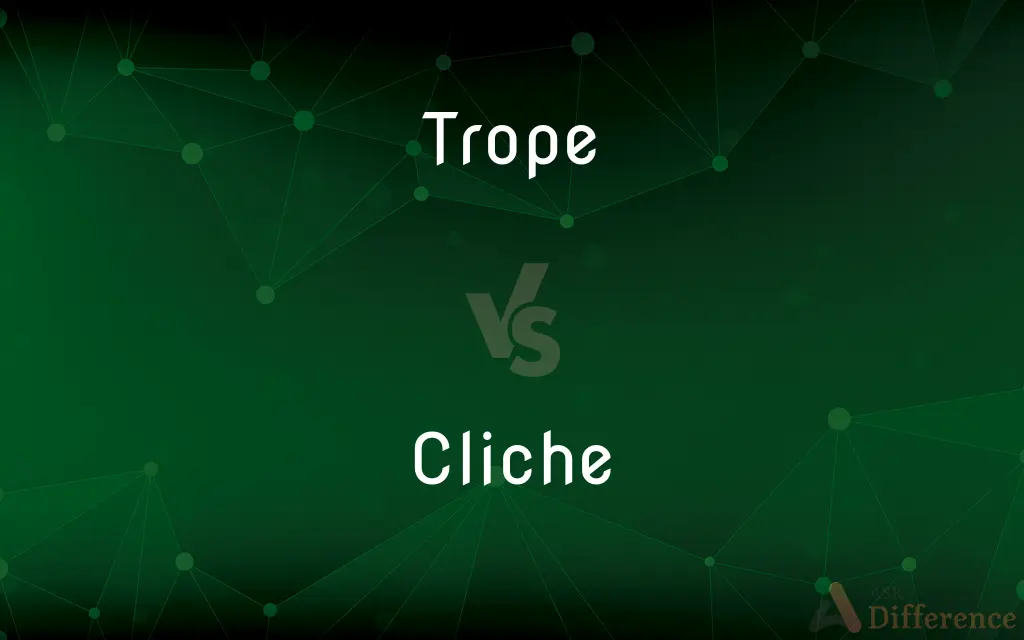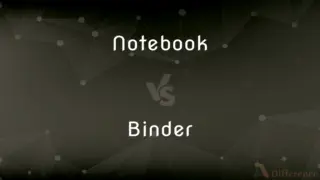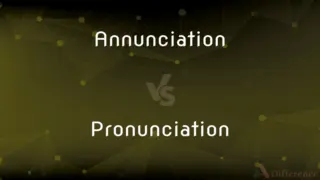Trope vs. Cliche — What's the Difference?
By Fiza Rafique & Maham Liaqat — Updated on April 17, 2024
Tropes are common themes or devices in creative works used to convey universal concepts, while clichés are overused elements that lack originality and freshness.

Difference Between Trope and Cliche
Table of Contents
ADVERTISEMENT
Key Differences
Tropes are literary or artistic devices that serve as building blocks for storytelling, creating recognizable patterns or motifs. Whereas clichés, though originally tropes, become predictable and uninspiring due to excessive use.
In literature, a trope might be a scenario like the "rags to riches" story, which effectively engages the audience with a familiar narrative arc. On the other hand, a cliché might be an expression like "at the end of the day," which can detract from the impact of writing due to its triteness.
Tropes can be skillfully employed to add depth to a story or character, such as the "anti-hero" trope, providing complexity and relatability. Conversely, clichés often simplify situations or characters, reducing them to stereotypes that fail to capture nuance.
In film and television, tropes help in quickly establishing context or advancing the plot, like the "unlikely hero" trope. Clichés, however, such as the "car won’t start in a horror movie," may cause eye rolls due to their predictability.
Creative industries evolve by subverting or twisting tropes to keep the audience guessing and engaged, injecting freshness into familiar formats. Clichés, however, are generally avoided in innovative storytelling as they offer little to no surprise or originality.
ADVERTISEMENT
Comparison Chart
Definition
A common or recurring literary device, theme, or motif
An overly used phrase, theme, or plot device
Usage in Writing
To create familiarity and resonance
Often viewed negatively due to lack of originality
Audience Reaction
Can be positive if used creatively
Typically leads to disengagement
Potential for Subversion
High, as tropes can be twisted for originality
Low, as clichés are hard to revitalize
Example in Literature
Hero’s journey
"Love at first sight"
Compare with Definitions
Trope
A recognizable element that can drive the plot forward.
The 'mysterious stranger' trope often sets off a series of events.
Cliche
Often signifies a lack of original thought.
Using 'dark and stormy night' in a story is seen as cliché.
Trope
Can be refreshed or inverted to create surprise.
Inverting the 'damsel in distress' trope can lead to innovative stories.
Cliche
Found in both everyday language and in literature.
The 'happily ever after' ending is a cliché in fairy tales.
Trope
A common theme or device in storytelling.
The 'quest' trope features in many fantasy novels.
Cliche
Generally avoided in creative writing.
Starting a story with a character waking up is often considered cliché.
Trope
A tool for quickly establishing context or character.
The 'reluctant hero' trope is used to show character development.
Cliche
An overused saying or predictable plot element.
The phrase 'at the end of the day' has become a cliché.
Trope
Often used to connect with the audience through familiarity.
The 'love triangle' trope explores complex relationships.
Cliche
Can make communication less effective.
Saying 'every cloud has a silver lining' can dilute the message.
Trope
A figurative or metaphorical use of a word or expression
My sense that philosophy has become barren is a recurrent trope of modern philosophy
Perhaps it is a mistake to use tropes and parallels in this eminently unpoetic age
Both clothes and illness became tropes for new attitudes toward the self
Cliche
A trite or overused expression or idea
"Even while the phrase was degenerating to cliché in ordinary public use ... scholars were giving it increasing attention" (Anthony Brandt).
Trope
A figure of speech using words in nonliteral ways, such as a metaphor.
Cliche
A person or character whose behavior is predictable or superficial
"There is a young explorer ... who turns out not to be quite the cliche expected" (John Crowley).
Trope
A word or phrase interpolated as an embellishment in the sung parts of certain medieval liturgies.
Cliche
Usage Problem Clichéd.
Trope
A theme, motif, plot, or literary device that commonly recurs within a genre or work of fiction, especially when considered clichéd
“Finding the corrosion under the waxed-and-polished chassis of small-town America is itself an old trope” (James Poniewozik).
Cliche
Alternative form of cliché
Trope
An often recurring idea or image
“In our conversations, there was a running theme, a trope, of economic havoc, of drowned cities, of time running out” (Jon Gertner).
Cliche
Alternative form of cliché
Trope
Something recurring across a genre or type of art or literature, such as the ‘mad scientist’ of horror movies or the use of the phrase ‘once upon a time’ as an introduction to fairy tales; a motif.
Cliche
A stereotype plate or any similar reproduction of ornament, or lettering, in relief.
Trope
(medieval Christianity) An addition (of dialogue, song, music, etc.) to a standard element of the liturgy, serving as an embellishment.
Cliche
A trite or obvious remark.
Trope
(rhetoric) A figure of speech in which words or phrases are used with a nonliteral or figurative meaning, such as a metaphor.
Cliche
A trite or obvious remark
Trope
(geometry) Mathematical senses.
Trope
A tangent space meeting a quartic surface in a conic.
Trope
(archaic) The reciprocal of a node on a surface.
Trope
(music) Musical senses.
Trope
A short cadence at the end of the melody in some early music.
Trope
A pair of complementary hexachords in twelve-tone technique.
Trope
(Judaism) A cantillation pattern, or one of the marks that represents it.
Trope
(philosophy) Philosophical senses.
Trope
(Greek philosophy) Any of the ten arguments used in skepticism to refute dogmatism.
Trope
(metaphysics) A particular instance of a property (such as the specific redness of a rose), as contrasted with a universal.
Trope
(transitive) To use, or embellish something with, a trope.
Trope
(transitive) Senses relating chiefly to art or literature.
Trope
To represent something figuratively or metaphorically, especially as a literary motif.
Trope
To turn into, coin, or create a new trope.
Trope
To analyse a work in terms of its literary tropes.
Trope
(intransitive) To think or write in terms of tropes.
Trope
The use of a word or expression in a different sense from that which properly belongs to it; the use of a word or expression as changed from the original signification to another, for the sake of giving life or emphasis to an idea; a figure of speech.
In his frequent, long, and tedious speeches, it has been said that a trope never passed his lips.
Trope
Language used in a figurative or nonliteral sense
Common Curiosities
Can a trope become a cliché?
Yes, when a trope is overused without variation, it can become a cliché.
Why are tropes important in literature?
They help in building the narrative structure and connecting with the audience quickly.
Why should writers avoid clichés?
Clichés can make writing predictable and unoriginal, reducing the overall impact.
What is a cliché?
An overused expression or idea that has lost its impact due to excessive use.
What is a trope?
A recurring theme or motif in creative works used to convey ideas effectively.
How do audiences react to the use of tropes and clichés?
Audiences may enjoy well-used tropes but are generally critical of obvious clichés.
Can clichés ever be effective in communication?
Sometimes, for conveying ideas quickly in casual conversation, but less so in creative writing.
How can a writer avoid clichés?
By being aware of common clichés and striving to express ideas in fresh, original ways.
Are all clichés bad?
Not necessarily, but using them in creative work generally indicates a lack of originality.
How can tropes be used creatively?
By adapting or subverting them to surprise the audience and deepen the narrative.
What makes a cliché negative in writing?
Its predictability and the fact that it shows a lack of effort to find original expressions.
What's the difference between a trope and a stereotype?
A trope is a narrative tool, while a stereotype is an oversimplified and fixed image or idea of a particular type of person.
Can tropes be specific to a genre?
Yes, certain tropes are more prevalent in specific genres, like the detective in mysteries.
What is the impact of using clichés in professional writing?
It can undermine the credibility of the work and suggest a lack of creativity.
Do clichés have any advantages?
They can make communication faster in everyday language but are less desirable in literary contexts.
Share Your Discovery

Previous Comparison
Notebook vs. Binder
Next Comparison
Annunciation vs. PronunciationAuthor Spotlight
Written by
Fiza RafiqueFiza Rafique is a skilled content writer at AskDifference.com, where she meticulously refines and enhances written pieces. Drawing from her vast editorial expertise, Fiza ensures clarity, accuracy, and precision in every article. Passionate about language, she continually seeks to elevate the quality of content for readers worldwide.
Co-written by
Maham Liaqat














































